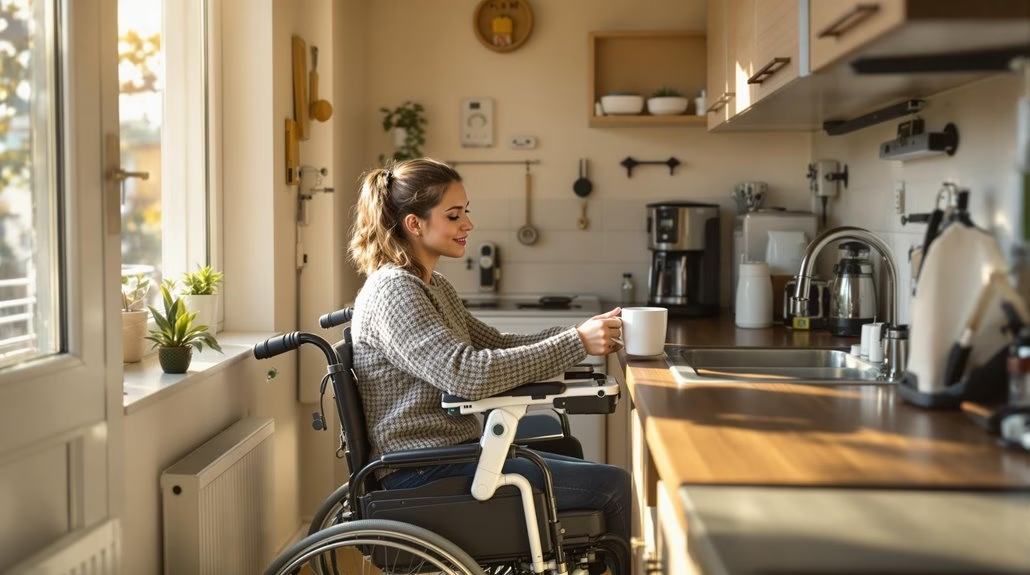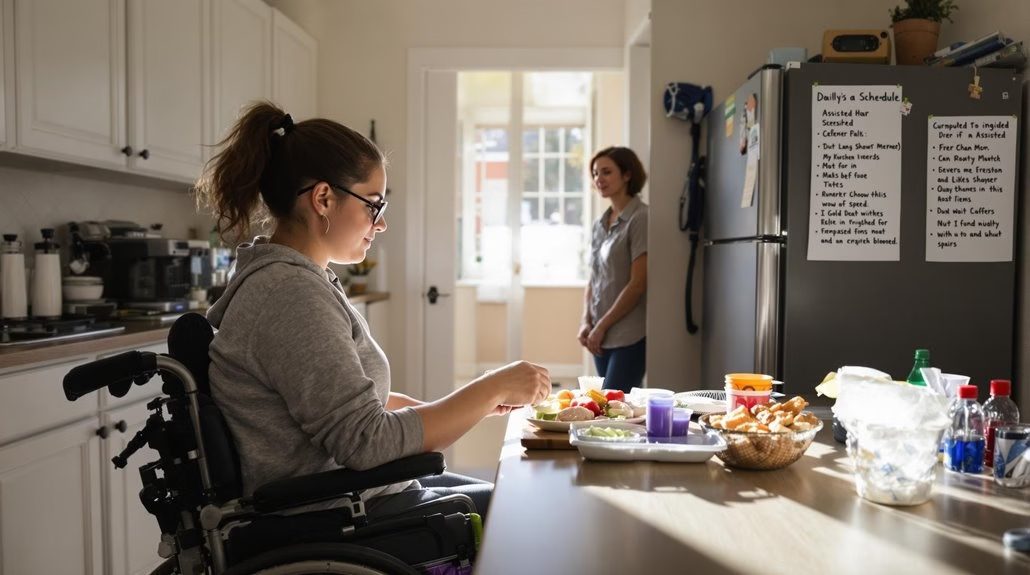You can absolutely live a fulfilling life with cerebral palsy. While the condition affects movement and muscle coordination, it doesn’t limit your potential for success, relationships, or independence. With proper medical care, support systems, and adaptive strategies, you’ll find countless opportunities in education, careers, and personal life. Many people with CP lead remarkable lives, achieve their dreams, and make significant impacts. There’s so much more to discover about thriving with cerebral palsy.
Understanding Cerebral Palsy and Its Impact
While cerebral palsy affects each person differently, it’s a neurological condition that impacts movement, posture, and muscle coordination. When you understand cerebral palsy definitions, you’ll learn that it results from brain damage or abnormal neurological development before, during, or shortly after birth.
You’ll notice that individuals with cerebral palsy may experience varying degrees of physical challenges. These can include difficulty with walking, balance, fine motor skills, and speech.
Some people might need mobility aids or assistive devices, while others may require minimal support. The condition doesn’t affect intelligence in most cases, though some may have concurrent learning disabilities.
Focus Family Care provides comprehensive solutions for individuals facing physical and cognitive challenges through specialized health and wellness support services.
Medical Advancements and Treatment Options
Modern medicine has transformed the outlook for people with cerebral palsy. You’ll find numerous treatment options available today that can greatly improve quality of life and daily functioning. Advanced rehabilitation techniques, combined with personalized care plans, help individuals develop stronger motor skills and greater independence.
- Physical therapy now includes innovative approaches like robotics-assisted movement training and virtual reality systems to enhance mobility and coordination.
- Emerging therapies such as stem cell research and targeted medication protocols show promising results in managing symptoms and improving muscle control.
- Assistive technologies, from smart devices to specialized mobility equipment, continue to evolve, making daily tasks more manageable.
With these medical advancements, you can help your loved ones with cerebral palsy access treatments that best suit their specific needs and goals. Licensed therapists provide customized rehabilitation plans that focus on improving strength, function, and maintaining independence in the comfort of your home.
Education and Academic Achievements
Despite physical challenges, students with cerebral palsy can achieve remarkable academic success with proper support and accommodations. You’ll find that inclusive classrooms and specialized educational resources make a significant difference in learning outcomes.
| Academic Support | Benefits |
|---|---|
| Assistive Technology | Enhanced communication and note-taking |
| Modified Equipment | Better physical access and comfort |
| Extended Time | Reduced pressure during tests and assignments |
| Support Staff | Personalized assistance and guidance |
When you’re working with students who have cerebral palsy, it’s crucial to focus on their abilities rather than limitations. They can excel in various subjects, pursue higher education, and achieve professional goals. Many universities now offer extensive support services, including adaptive equipment and specialized software, ensuring that students with cerebral palsy have equal opportunities to reach their full academic potential.
Similar to home health therapy, educational support can be tailored to meet individual needs and promote independence in academic settings.
Career Opportunities and Workplace Adaptations
People with cerebral palsy can pursue diverse career paths across numerous industries, from technology and education to business and creative arts.
You’ll find that many employers now embrace inclusive workplaces and provide job accommodations to support your success.
- Modern technology and adaptive equipment can help you perform tasks efficiently, whether you need specialized computer interfaces, ergonomic furniture, or communication devices.
- Your workplace can implement physical modifications like accessible entrances, adjustable desks, and modified restroom facilities to guarantee your comfort and productivity.
- Flexible work arrangements, including remote work options, modified schedules, and task adjustments, can help you maintain a healthy work-life balance while managing your symptoms.
With proper accommodations and support, you can thrive in your chosen profession and contribute meaningfully to your organization’s goals.
Similar to private in-home care services, workplace accommodations can be customized to meet your unique needs and ensure your safety and comfort throughout the workday.
Building Meaningful Relationships and Family Life
Living with cerebral palsy doesn’t limit your ability to form deep, lasting relationships and create a fulfilling family life. Your friendship dynamics may require open communication about your needs, but you’ll find that genuine connections form naturally when you’re authentic and engaged in shared interests.
| Relationship Type | Building Blocks |
|---|---|
| Friendships | Clear communication, shared activities |
| Romance | Honesty, mutual understanding |
| Family Support | Trust, adaptability |
You can pursue dating, marriage, and even parenthood with proper planning and support systems in place. Many people with cerebral palsy successfully raise children and maintain loving partnerships. Focus on developing your emotional intelligence, establishing boundaries, and nurturing relationships with those who appreciate your unique perspective. Remember that family support, whether biological or chosen, plays an essential role in your personal growth and well-being. With skilled home healthcare services available 24/7, you can maintain independence while receiving the personalized support needed to thrive in your relationships.
Assistive Technologies for Daily Living
Modern assistive technologies open up new possibilities for independence while strengthening the connections discussed in relationships and family life.
Assistive technology bridges independence and intimacy, creating new ways to live autonomously while deepening our most important relationships.
You’ll find that smart home devices, virtual assistants, and wearable technology can transform daily routines into seamless experiences. Whether you need mobility aids for getting around or communication devices to express yourself, there’s a solution that fits your unique needs.
- Combine adaptive utensils with sensory tools to make mealtimes more comfortable and independent, allowing you to enjoy dining with loved ones.
- Use assistive apps to manage schedules, medications, and daily tasks while staying connected with your support network.
- Integrate smart home features that let you control lighting, temperature, and security with voice commands or simple gestures, enhancing your autonomy at home.
Physical Activities and Recreation
Engage in physical activities that bring joy and energy to your life with cerebral palsy. Through adaptive sports and recreational therapy, you’ll discover numerous opportunities to stay active while building strength and confidence. You can participate in swimming, wheelchair basketball, or seated yoga based on your abilities and interests.
| Activity Type | Benefits | Equipment Needed |
|---|---|---|
| Swimming | Low-impact, full-body workout | Pool noodle, flotation devices |
| Wheelchair Basketball | Upper body strength, teamwork | Sports wheelchair, basketball |
| Seated Yoga | Flexibility, stress relief | Yoga mat, support blocks |
| Dance Therapy | Balance, coordination | Comfortable clothing |
| Adaptive Cycling | Cardiovascular health | Modified bicycle, safety gear |
Remember that your physical therapist can help you choose activities that match your mobility level and goals while ensuring safety and enjoyment.
Independent Living Strategies
While cerebral palsy presents unique challenges, you can develop effective strategies to maintain your independence at home and in daily life. By focusing on adaptive living solutions and building essential life skills, you’ll gain confidence in managing daily tasks and achieving greater autonomy.
- Customize your living space with practical modifications like grab bars, non-slip mats, and accessible storage solutions to make daily activities easier and safer.
- Learn time management techniques to organize your daily routines, including meal preparation, personal care, and household maintenance, at a pace that works for you.
- Work with occupational therapists to develop personalized strategies for tasks like dressing, cooking, and using technology, adapting these activities to your specific needs and abilities.
These independent living strategies will help you create a more comfortable and self-reliant lifestyle.
Mental Health and Emotional Well-being
Living with cerebral palsy involves more than just physical challenges – your mental and emotional health play crucial roles in your overall well-being.
It’s important to develop effective coping strategies to manage stress, anxiety, and feelings of frustration that may arise from daily challenges.
Building strong support networks can greatly impact your emotional resilience.
Connect with family, friends, therapists, and support groups who understand your journey and can provide encouragement when needed.
You’ll find valuable perspectives and practical advice from others who share similar experiences.
Don’t hesitate to seek professional counseling if you’re struggling with depression or anxiety.
Mental health professionals can help you develop personalized coping strategies and strengthen your emotional well-being.
Remember that prioritizing your mental health is just as important as managing physical symptoms.
Success Stories and Inspiring Examples
Despite facing physical challenges, countless individuals with cerebral palsy have achieved remarkable success in various fields.
You’ll find inspiring athletes competing in Paralympic sports, motivational speakers sharing their journeys, and professionals excelling in diverse careers.
These success stories demonstrate that CP doesn’t define your potential or limit your ability to make an impact.
- Paralympic swimmer Benoit Huot has won multiple gold medals and broken world records, showing that physical limitations don’t restrict athletic achievement.
- Josh Blue, a stand-up comedian with CP, uses humor to educate audiences while challenging stereotypes through his performances.
- Bonner Paddock became the first person with cerebral palsy to climb Mount Kilimanjaro, proving that determination can overcome seemingly impossible obstacles.
These individuals aren’t just succeeding – they’re transforming perceptions and inspiring others to pursue their dreams.
Conclusion
People with cerebral palsy can live rich, meaningful lives filled with joy and purpose. Thanks to today’s medical care, caring friends and family, and helpful support services, daily tasks are easier to manage than ever before. You can build a career you love, make lasting friendships, and enjoy life’s precious moments – just like anyone else. The key is having the right support and believing in yourself.
Remember, your path might look different from others, but that doesn’t make it any less valuable or worthwhile. Think of it like taking a unique route to the same destination – there may be different turns along the way, but you’ll still reach your goals.
You don’t have to figure everything out alone. Focus Family Care understands your journey and is here to walk beside you every step of the way. Our caring team can help you or your loved one create a life filled with independence, dignity, and happiness.
If you or a loved one need help, don’t wait. Reach out to Focus Family Care today at (561) 693-1311 or email us at info@focusfamilycare.com.





